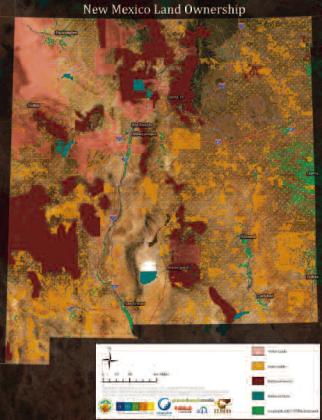GRANTS, N.M. – The state of New Mexico has unveiled its inaugural Climate Adaptation and Resilience Plan (CARP), a new strategy aimed at protecting the state’s natural beauty form the impacts of climate change. This plan has implications for the Cibola National Forest, Mount Taylor, and the Zuni Mountains—areas that are not only ecological treasures but are crucial to the cultural heritage and livelihood of communities in Cibola.
CARP emphasizes a multifaceted approach that includes protecting ecosystems, managing natural resources sustainably, and enhancing public health and infrastructure resilience. The plan does not offer specifics, but instead is a broad plan with expectations to protect the state’s nature.
Find the plan online at https://www.climateaction.nm.g ov/carp/
How will CARPimpact Cibola?
In regions like the Cibola National Forest, CARP will translate into more robust fire management and reforestation strategies, which are critical given the forest’s vulnerability to wildfires.
Across the national forest, CARP calls for the preservation of endangered species like the Mexican Spotted Owl.
Mount Taylor
Mount Taylor, a site revered by local Indigenous American tribes, stands to benefit from the plan’s focus on preserving cultural heritage and strengthening community ties. Initiatives under CARP include efforts to protect the area from the adverse effects of climate change while respecting and integrating traditional knowledge and practices in environmental stewardship.
•Cultural and Ecological Preservation
Efforts will focus on preserving the cultural significance and ecological integrity of Mount Taylor. This might include controlled burns and other fire management techniques to prevent large-scale wildfires, alongside conservation projects that involve local tribes to integrate traditional knowledge.
• Recreational and Tourism Enhancements:
Improvements in infrastructure to support sustainable tourism, which is vital for the local economy, while ensuring that recreational activities do not harm the area's natural and cultural resources.
Improved Trail Systems: CARP calls for the development of well-marked and sustainable hiking trails that minimize environmental impact while providing access to scenic views and cultural sites, potentially incorporating educational signage about the area's ecological and cultural significance.
Eco-Friendly Facilities: CARP demands for the construction of eco-friendly facilities, such as green restrooms and picnic areas, which use sustainable materials and technologies to reduce environmental footprints.
Cultural Heritage Sites: CARP calls for the development and preservation of cultural heritage sites, with guided tours and informational resources that highlight the historical and spiritual significance of Mount Taylor to Native American tribes.
Visitor Education Programs: CARP calls for the implementation of visitor education programs that teach tourists about the local environment, cultural history, and responsible recreation practices to promote conservation- minded tourism.
Zuni Mountains
The Zuni Mountains are expected to see investments in water systems and infrastructure resilience. This area, characterized by its rich wildlife and scenic beauty, faces threats from prolonged droughts and erratic precipitation patterns. CARP aims to secure water resources and enhance flood management, which will not only protect the natural landscape but also support the agricultural needs and water rights of local communities.
•Forest Management and Restoration
The plan includes enhanced forest management strategies to restore and maintain healthy forest ecosystems, which are crucial for wildlife, water regulation, and local climate moderation.
•Water Resource Management
Given the significance of water in this region, the plan will focus on improving the resilience of water systems to manage and withstand the impacts of increased drought and irregular precipitation patterns.
State officials have outlined a participatory approach to refine and implement the plan, with a series of Community Conversations across the state starting in May. These discussions will provide a platform for residents of affected areas to voice their needs and insights, ensuring that local strategies align with broader state goals.
Give your input to the state at any of the following meetings:
• May 20: Truth or Consequences.
• May 21: Roswell.
• May 22: Albuquerque.
• June 3: Farmington.
• June 4: Taos.
• June 5: Las Vegas.
• June 6: Albuquerque, Tribal-focused event. The state’s proactive stance on climate adaptation comes at a crucial time, as recent events like the Calf Canyon-Hermits Peak Fire anniversary underscore the urgency of effective climate resilience measures.

